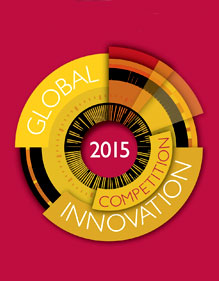|
Getting your Trinity Audio player ready...
|
 Corruption Watch has once again entered the Global Innovation Competition (GIC), and we need your support, because the public voting round has opened!
Corruption Watch has once again entered the Global Innovation Competition (GIC), and we need your support, because the public voting round has opened!
South Africa is one of the 12 key countries taking part in the 2015 competition, organised by Johannesburg-based Making All Voices Count – the others are Bangladesh, Ghana, Indonesia, Kenya, Liberia, Mozambique, Nigeria, Pakistan, the Philippines, Tanzania and Uganda. Of the 241 fresh and inspirational ideas submitted, 19 were from South Africa. Kenya leads with 48.
This year we are motivating for a hackathon – Code against corruption – which is listed in the Sub-national Governance category. We want to involve young technology developers in creating innovative technological solutions to deal with corruption in the schools, housing, and drivers and vehicle licensing sectors in Gauteng province. These are sectors that affect residents of all ages and from all walks of life.
Go to GIC2015 and cast your vote for our entry – you may vote only once for an idea, but for as many ideas as you like.
Last year, for the inaugural GIC, we submitted an idea titled Online and mobile organising against corruption, which featured in the Citizen Engagement category.
The GIC aims to support “innovative thinking, scaling, and research that deepens both existing and new innovations that enable better citizen engagement and government responsiveness”. It encourages creative ways to build more transparency, accountability and responsiveness into the interaction between citizens and governments across Africa and the world beyond.
How it works
The public may vote up until 23 November 2014, which means that there are just over four weeks for us to make an impression – with your support.
Only 50 entries will go through to the second round – those that have garnered the most votes, plus a certain number of wildcards. Round two, which starts on 19 December, involves a peer and jury review process, after which 30 of the 50 entries will go forward to the third round, the screening review.
In this round, which takes place between 28 January and 25 February 2015, the competition organisers will discuss the submissions with the respective applicants, to gain the best possible understanding of the ideas. After this, the GIC committee will choose the finalists.
Finalists will participate in the Global Innovation Week in Jakarta, Indonesia, and winners will be announced on 9 April 2015. They will receive a grant from a pool of £300,000 to support their projects, as well as mentoring.
Read all about our submission below:
Idea title
Code against corruption (a hackathon competition). Host a competition (hackathon) that targets young technology developers to create innovative technological solutions to deal with corruption in the following sectors within the Gauteng province:
- Schools
- Drivers and vehicle Licensing
- Housing
Which theme does your idea fit best?
Sub-national government.
What is your innovative idea/concept?
Code against corruption aims to engage young professionals specialising in computer programming, graphic design and software design to use their technical skills to create innovative concepts to detect, combat and communicate about corruption using new technologies. Concepts can be in the form of websites, social network applications, smartphone applications, or even machines/hardware solutions. Participants will be given a problem statement for each of the sectors – schools, licensing and housing – and required to choose one sector to focus on. The final products will be judged by a panel of experts and the winners of the hackathon will be rewarded with great prizes and a possible internship at a leading ICT company.
Why do you believe that your idea fits in the theme that you have selected?
The majority of corruption complaints (37%) received by Corruption Watch stem from Gauteng province. The production of a viable technological solution to curb corruption could result in a decrease in the number of corruption allegations in this province.
How does your idea promote better governance, transparency, accountability or decreased corruption?
By mobilising the youth to participate in the hackathon, we will encourage them to be part of the solution to curbing corruption in the province, and to help create a culture of zero tolerance. The design brief will instruct participants to create a technological solution that educates the public about how corruption occurs, how to combat it (i.e. tools to hold their leaders accountable) and how to report corruption in this field, so reducing levels of corruption.
How do you intend to engage government?
Corruption Watch will approach the Gauteng provincial government to jointly host the hackathon, with the intention of assisting government in dealing with the corruption occurring within their provincial departments by creating innovative and valuable technological solutions. By closing the loopholes that exist within the system, technology will assist the government in saving money that is currently being lost due to corruption and will also highlight government’s intention to publicly deal with the problem.
How does your concept/idea engage with gender equality and or the rights of disadvantaged groups?
The competition is open to all races, genders and socio-economic classes to participate in the hackathon. Participants will be encouraged to create a solution that is accessible to all population groups. According to recent reports, 70% of the South African population uses feature phones. Thus if the technological solution to curb corruption is mobile, it must be available on feature phones so that it is accessible to those who are most affected by corruption.
Why should you win?
Corruption Watch highlights corruption and also seeks viable solutions to deal with it. We are passionate about working with the youth to own the fight against corruption and to be part of the solution in creating a more transparent and accountable society.









